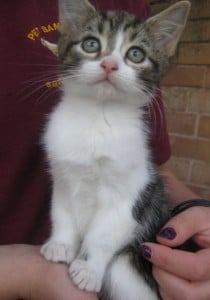Pet Advice Guides for Pet Owners
Choosing a Cat Guide
All kittens are cute! If you are thinking of getting a cat or adding a newcomer to your feline family it’s best to consider the options. There are lots of cat enthusiasts out there who show their cats and have beautiful specimens of a particular breed. These cats will usually be expensive. Their type and characteristics have been chosen by a human, they will have been bred to comply with definite specifications. So if you know what you want and can afford it, you can take your pick. Breeders with kittens for sale advertise on the internet and in cat magazines.
Pedigree kittens are, in our many years experience, often more delicate and picky than the ordinary love-match mixed breed. Make sure that you see the parents and that the kittens have been well-handled and socialized. You need to see vaccination documents and have assurance of worming and parasite treatment also. Pedigree cats are often kept indoors, there is an increased risk of them being stolen if let out, so that’s something to bear in mind also.
If you are choosing a long haired breed, remember that you will have to groom the cat on a daily basis. Check out the breed characteristics and find out how high maintenance, or otherwise, your purebred cat will be.
Most other cats will be the result of a chance mating and cats are extremely fortunate that they can choose a mate. Few other domestic pets are able to do so. Cats go calling, tom cats come a-running and a litter of beautiful kittens will appear in due course.
They may not all look the same! It’s not unusual to have a couple of gingers, a long haired tortie, an all-black and some tabbies, all in the same litter. Which colour will you choose? There is so much variety in love-match cats that your preference is all that matters.
Again, if you choose a long haired kit, you will have to do some grooming, although ‘fluffy’ cats, as opposed to persians, don’t seem to tangle up so much and will often look after themselves very nicely.
There are always lots of adult cats in shelters all over the U.K. and you might consider giving a home to a grown up. The cat will be litter trained, already vaccinated and usually spayed or neutered, so that is all done for you. Make sure that the cat you choose has a nice, friendly personality and looks healthy. Our health check list will tell you what to look for – ask about food preferences as some cats are very set in their ways when it comes to meal times.
Unless you are kind enough to give a home to a ‘golden-oldie’ you needn’t be put off by age. When cats are well cared for, not allowed to get too fat and have lots of fresh air and exercise, they will usually go on fit and well to their late teens.
If you are set on a baby-cat, then choose a kitten who looks bright and healthy, take time to observe the kittens playing and eating as well if possible. Kittens need to be well handled from the first week and if they don’t get used to humans when they are very tiny, they will rarely respond quite as well when older. Very often you can tell how a kitten is going to turn out from a very early age. There’s always one in a litter who is bold and sassy, one who pushes everyone out of the way to get his head in the food dish first and then there’s a little shy one who hangs back. The first will be adventurous, the second will be easy to bribe and the shy girl might suit you if you want a cat to stay indoors.
You can tame the tiny tigers though – with a lot of time, fuss and t.l.c. A kitten should at least have had his or her first vaccination before leaving home. Kits are too immature to go to a new place before nine weeks and their immune system will not be fully developed before then. Younger than this and it’s more difficult to rear them.
Always ask if the kitten you are thinking of taking home with you has had a vet health check. Our vet gives all the kittens a full examination when they go for their first vaccination. Kittens can have ear mites, they might have a weak or irregular heartbeat or be running a temperature, in which case the vaccination will be put on hold until they have had treatment and are well again.

